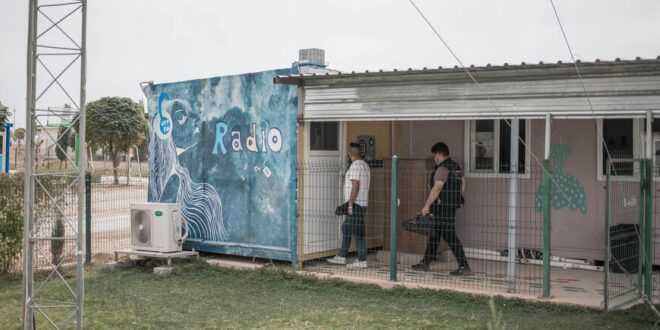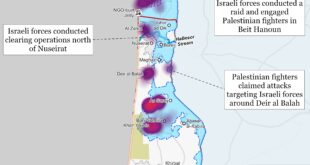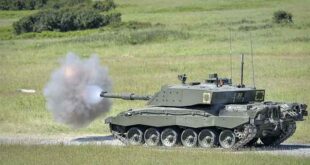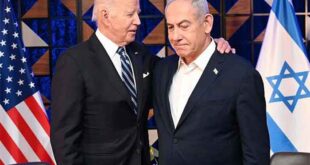The media and a member of the Kurdistan Region parliament have spoken out against threats and pressure from the PKK, as tensions and drone attacks increase.
As drones and rockets target both Kurdistan Workers Party (PKK) fighters and Turkish military deployed to Iraq, an attack by PKK supporters on a local media outlet and continued child recruitment by the group have raised concern in the Kurdistan Region.
Multiple PKK attacks on peshmerga fighters and others have been reported in recent weeks.
On June 5, the PKK reportedly kidnapped a peshmerga fighter from his home in Sinjar in Iraq’s Ninevah province and attacked a peshmerga position in Dahuk province in the Kurdistan Region of Iraq. The PKK had, on the same day the previous year, killed five peshmerga fighters in an ambush and a commemoration ceremony was held in Dahuk for the soldiers killed.
Pressure from the PKK is also being exerted through threats against media workers, members of parliament and others.
The May 18 attack targeted journalists from the Kurdistan 24 media outlet, one of the largest in the Kurdistan Region, in the city of Sulaimaniyah. The Metro Center for Journalists Rights and Advocacy and local branch of the Kurdistan Journalists Syndicate condemned the attack in a joint press conference.
They said that the attack had come after the TV crew had refused to blame “Turkey” for an assassination of a businessman in the area with links to the PKK, noting that journalistic ethics would require them to refrain from assigning culpability amid an ongoing investigation.
Kurdistan 24 Public Relations Director Shvan Shwani told Al-Monitor May 26 that the PKK supporters had physically attacked the media outlet’s journalists, punching and kicking them. He noted that local police nearby had shot into the air to get the PKK supporters to stop. However, he said, the attackers had continued to chase the journalists as they were trying to escape, proceeding to smash up the crew’s cameras and other equipment.
Drone attacks on alleged PKK targets in Iraqi Kurdistan May 21 that killed at least five people were followed the next day by an attack claimed by a murky group that calls itself Ahrar Sinjar, believed to be linked to Iran’s Islamic Revolutionary Guard Corps (IRGC), on a base hosting Turkish troops in Ninevah province. A Kurdish chef was reportedly the only one killed at the base.
More recently, rockets targeted the base June 9, though no casualties were reported in this attack.
A June 8 Washington Institute for Near East Policy profile of Ahrar Sinjar claimed that “the preponderance of evidence shows that Ahrar Sinjar is a facade group” for Iraqi militias close to the IRGC.
It continued, “The Ahrar Sinjar brand may be reserved for anti-Turkish attacks that are portrayed as linked to Yezidi grievances with Turkey and which are launched from Nineveh.”
Meanwhile, Kurdish politicians and others who do not toe the official PKK line also continue to receive threats from the PKK, though often indirectly.
In a May 22 interview in Erbil, member of Kurdistan parliament Chiya Sharif told Al-Monitor that, after interviews with local media outlets, he had received many messages stating that “people from the PKK want to kill me … after I tweeted some things about the PKK.”
He said that he had received threats “via Twitter, via Facebook and from numbers outside Kurdistan, blocked numbers, [often from] Bakur [Kurdish area in Turkey], outside Kurdistan or in Europe.”
Sharif stressed, “It’s my job to take care of my people in Kurdistan. I am not for war; I am against the war.”
However, he added, the Kurdistan Regional Government (KRG) has always been open to “new dialogue, new peace processes,” by offering to mediate between the group and Turkey. However, he said, the PKK has never kept any of its pledges, implying it and its claims are not to be trusted.
As Turkey’s Operation Claw Lock in northern Iraq continues, the PKK boasts death counts that seem improbable.
On June 6, The New Arab quoted a spokesman for a “PKK-affiliated” group claiming that the PKK had “killed 450 Turkish soldiers, and wounded 98 others within one month of fighting.”
Sharif noted, “I am not afraid [of the PKK],” stressing that his father was a peshmerga and that he had spent two of the first three years of his life imprisoned with his mother under the Baath regime on account of his father’s activities.
Sharif represents Zakho, in the northwestern corner of the Kurdistan Region, near both the Turkish and Syrian borders, and is a member of the largest party in the government, the Kurdistan Democratic Party.
The PKK is considered a terrorist organization by the United States, the European Union and Turkey. Most of the commanders are Turkish nationals who have lived abroad for a long time and are wanted by the authorities in Turkey.
KRG officials frequently bring up the fact that hundreds of villages in the northern part of Iraqi Kurdistan are empty of their inhabitants due to the PKK presence.
Many are also concerned about the effects of the indoctrination of vulnerable youths.
The PKK has long recruited underage youths, suppressed dissent and engaged in aggressive attempts to control narratives and education.
Over the decades of its existence, it has killed many teachers and conducted multiple attacks on schools in southeastern Turkey, including a highly publicized 1994 public square execution of six public school teachers in the Kurdish-majority town of Tunceli.
Joint Crisis Coordination Center for the Kurdistan Region Director Hussein Kalari told Al-Monitor in a May 11 interview at his office that the PKK and its local affiliates continue to recruit and indoctrinate minors, “as young as 10 or 12 years old.”
Most officials Al-Monitor has spoken have stressed that both the People’s Protection Units (YPG) in northeastern Syria and the Sinjar Resistance Units are for all practical purposes local affiliates of the PKK.
Several have expressed concerns about vulnerable Yazidi women who seem to be targeted by the PKK for recruitment in camps for the internally displaced in the Kurdistan Region and other areas amid continuing instability in the Sinjar area.
There are frequent reports on social media of adolescents — especially adolescent girls, according to multiple KRG officials, but also boys — having been kidnapped by these groups across the PKK’s area of operations.
Most of these children are believed to then be moved to camps in the Qandil Mountains in the Kurdistan Region to be trained and indoctrinated in the villages and areas emptied of their original inhabitants.
In late May, a 13-year-old girl was reported taken in Qamishli in northeastern Syria, while a 17-year-old Yazidi girl was said to have been kidnapped in another area also under the US-backed, YPG-dominated Syrian Syrian Democratic Forces (SDF). The Council of Syrian Yezidis claimed in reporting this crime that the “PYD [a sister party of the PKK] targets and kidnaps underage girls and boys.”
There have been multiple other incidents reported by locals, but given media restrictions and bans it is difficult to verify these reports. In November, for instance, a Kurdish opposition group in Syria decried the alleged abduction of three teenage girls by the YPG.
Many of the PKK fighters the group reports having been “martyred” in northern Iraq are young women of Syrian origins, though their dates of birth are not given.
Protests in northeastern Syria over the past year by the parents of adolescents “kidnapped” have been suppressed by the SDF, eyewitnesses say.
Local Kurdish journalists with whom Al-Monitor is in contact have been arrested by the SDF for covering these protests and warned not to speak about it afterward.
In late May, 23 human rights and other organizations demanded in a joint letter that the Kurdish-led administration in northeastern Syria end the continued recruitment of child soldiers in the area.
The letter stressed, “Children must be returned to their families and those involved in acts of child recruitment, which may amount to war crimes, must be held accountable.”
The journalists attacked by the PKK supporters in Sulaimaniyah May 18 were from the Kurdistan 24 network, the Erbil offices of which were damaged in a March 13 attack by the IRGC. Iraqi militias linked to the IRGC have in recent years strengthened their collaboration with the PKK and its affiliates.
The media outlet had reported on PKK crimes in the region before.
In February, it reported that it had “received photographs of 12- and 13-year-old boys and girls illegally recruited [by the PKK],” citing a source that said “the PKK has tricked these children through social media and brainwashed them with fake promises.”
Elderly PKK commander Duran Kalkan is seen in the pictures with his arms around the shoulders of the adolescent girl recruits.
The US Rewards for Justice program offers “a reward of up to $3 million for information on [Kalkan],” noting that he had been named a “Specially Designated Narcotics Trafficker (SDNK) pursuant to the Foreign Narcotics Kingpin Designation Act (Kingpin Act) on April 20, 2011.”
Kurdistan 24 has been banned from SDF territory across the border in Syria, as have multiple other Kurdish and other media outlets.
In response to a question about whether the PKK-linked YPG and the Kurdish-led administration just across the border from his hometown had created an area welcoming to Kurds, Sharif said the entity was more akin to “North Korea.”
“It is a dictatorship,” he said.
In April, he noted, some 500 people had fled SDF-held areas of northeastern Syria to Zakho in one week alone.
He said he had spoken to some and that they had said they had left because the “PKK are against the people” — notably, he said, calling the SDF the PKK — and that they had been pressured to join the armed forces.
Sharif said that, after a week, “the KRG closed the border since not everyone is a refugee — maybe some are terrorists.”
“We in the KRG are against closing the border, but people there are fighting our peshmerga [in Iraqi Kurdistan areas], he said. “We cannot put our peshmergas’ lives in danger.”
 Eurasia Press & News
Eurasia Press & News




